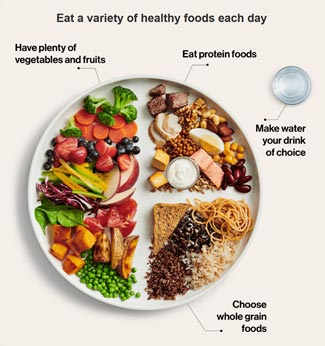Drinking water regularly throughout the day is the best way to stay hydrated, especially in warm weather and when being physically active. While water is the best choice for staying hydrated, vegetables, fruit and milk also contain a lot of water and are healthy choices.
Our bodies lose water by sweating, breathing and getting rid of waste. If you lose more fluid than you take in, you get dehydrated. You need to replace what is lost. Young children and seniors are at higher risk of becoming dehydrated.
Water is a healthy, calorie-free way of staying hydrated. It helps your body work in a number of ways:
- maintains your body temperature,
- helps break down food so that your body can absorb the nutrients,
- helps get rid of waste,
- acts as a cushion between cells, muscles, and joints, and
- keeps your bowels "regular”.
Here are some tips to keep you and your family hydrated and healthy
Make water your drink of choice:
- Carry a reusable water bottle when you are out
- Drink it hot or cold
- Ask for water with your food when eating out
- Keep sugary drinks out of the house
- Keep a pitcher of cold water in the fridge
- Drink water with your meals
- Bring sliced fruit to sporting events for a snack
- Add slices of fresh fruit or herbs to your water for extra flavour
- Be a role model – make healthy drink choices in front of your children
Offer healthy drink options other than water, including:
- White milk (unsweetened lower fat milk)
- Unsweetened fortified plant-based beverages such as soy beverage
- Unsweetened coffee and teas
For more information on healthy drink choices, visit https://food-guide.canada.ca/en/




